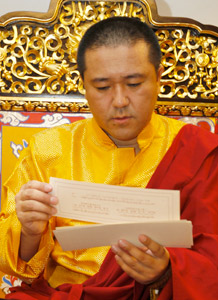A mantra is a sound, syllable, word, or group of words that is call a "mind protector" in Tibetan Buddhism. Use and type of mantras varies widely today. See two different methods below.
Mantra

Tulku Orgyen Phuntsok gives a "big explanation" of mantra in Tibetan Buddhism, giving a complete and detailed account of how mantra is used in Vajrayana or the Secret Mantra Path. With samples of mantras chanted by Tulku Orgyen. PLAY MP3.
Finding your own mantra.
What a personal mantra does is to jump the track from obsessive thoughts to a repetition of a phrase that might help you. It keeps us from digging in with the obsessive thoughts and allows us to pause and clear the mind through focusing on something else.
Many of us already have a mantra such as "Please, oh please," or something similar that we say under stress. Tibetan lamas have said that the American mantra starts (and ends) with an expletive. *@!#! Oh *@!#!, oh *@!#!, oh*@!#! Does this really protect the mind?
Sometimes a mantra can be used as a social survival skill. "Don't say it, don't say it, don't say it." can help through many a situation. A line from a song can become a personal mantra. "Let it be," is good one. Others have found these mantras useful:
"That was then, this is now."
"What would love do now?"
"It feels real, but it isn't true."